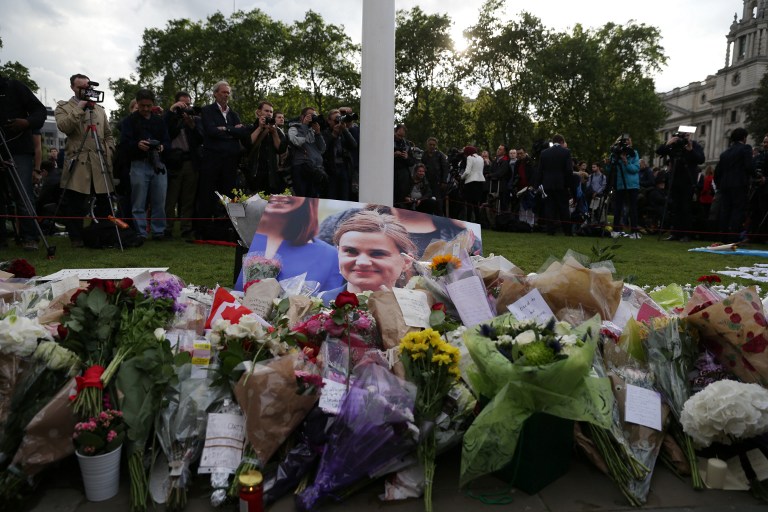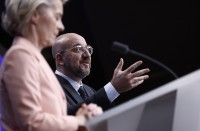
Labour MP Jo Cox, a 41-year-old former aid worker also known for her advocacy for Syrian refugees, was killed on June 16, outside a library where she was supposed to meet constituents in Birstall in northern England, just a few miles (kilometres) from where she was born.
/ AFP PHOTO / DANIEL LEAL-OLIVAS
by Alice Ritchie
LONDON, United Kingdom (AFP) — Jo Cox, a British member of parliament who campaigned for the country to stay in the EU and for more aid for Syrian refugees, was killed in a brutal attack on Thursday.
A 52-year-old man is in police custody after Cox was shot and stabbed numerous times in her constituency in northern England.
Campaigning for the June 23 referendum has been suspended through Saturday out of respect.
This is what we know so far:
– Who was Jo Cox? –
The 41-year-old mother-of-two was elected last year as an opposition Labour party MP for Batley and Spen, a constituency in West Yorkshire, where she grew up.
After graduating from the University of Cambridge, she helped set up a pressure group, Britain in Europe, and spent two years working in Brussels.
She was policy chief for aid agency Oxfam and after entering parliament, was a prominent campaigner for refugee rights.
Cox co-chaired the parliamentary group on Syria and spoke out in favour of immigration in a powerful first speech in the House of Commons.
– What happened? –
Cox was on her way to a scheduled meeting with constituents at the library in Birstall, a large village in Yorkshire, when she was attacked.
Police were called at 12:53 pm (1153 GMT), a few minutes before the 1:00 pm meeting. She was pronounced dead at 1:48 pm by a paramedic team.
“She was attacked and sustained serious injuries from both a firearm and a knife,” West Yorkshire Police Constable Dee Collins said in a statement.
Eyewitnesses said she was shot two or three times and repeatedly stabbed as she lay on the pavement, in what Collins said was “an isolated, but targeted attack upon Jo”.
There were reports that the suspect shouted “Britain first” or “put Britain first”, although this is disputed and police have made no mention of it.
A 77-year-old man who tried to help Cox sustained a “serious injury to his abdomen” and is currently in a stable condition in hospital, police said.
The only suspect, a 52-year-old man, was arrested nearby shortly afterwards. Weapons including a firearm were recovered from the scene.
– Who has been arrested? –
British media named the suspect as Thomas Mair, described by those who knew him locally as a loner with mental health problems, including obsessive compulsive disorder.
The Southern Poverty Law Center, a US advocacy group, said it had records showing Mair had bought copious reading material from the National Alliance, a neo-Nazi organisation.
The Guardian said police were believed to have found Nazi regalia and far-right literature in their search of his house.
The Daily Telegraph newspaper also reported that Mair was a subscriber to S. A. Patriot, a South African magazine published by the pro-apartheid group the White Rhino Club.
Police said they were treating both the suspect’s alleged mental illness and reports of his links to right-wing extremism as key lines of inquiry.
Detectives have up to 96 hours to question the suspect before they must charge or release him, according to government guidelines for serious crimes such as murder.
– Who were Cox’s family? –
She was married to Brendan Cox, a former adviser to prime minister Gordon Brown who also worked at the Save the Children charity.
They had two young children, Lejla and Cuillin, and lived on a converted barge near Tower Bridge in London.
Her husband said: “She would have wanted two things above all else to happen now: one that our precious children are bathed in love and two, that we all unite to fight against the hatred that killed her.”
– Who else has reacted?
Conservative Prime Minister David Cameron said the nation was “shocked” by the murder.
On a visit to Birstall Friday, he said: “Where we see hatred, where we find division, where we see intolerance we must drive it out of our politics and out of our public life and out of our communities.”
Standing alongside him, Labour leader Jeremy Corbyn described Cox as “an exceptional, wonderful, very talented woman”.
US Secretary of State John Kerry expressed his “deep sorrow” for Cox’s death, adding: “It is an assault on everybody who cares about and has faith in democracy.”
– How rare are MP killings? –
Labour MP Stephen Timms was stabbed in the stomach in 2010 by an Islamic extremist but survived the attack.
The Irish Republican Army paramilitary group killed Ian Gow in a car bomb in 1990, Anthony Berry in the 1984 Brighton bombing and shot dead Robert Bradford in 1981.
Former Northern Ireland secretary Airey Neave was killed in a car bomb in 1979 that was claimed by the Irish National Liberation Army.
ar/dt/kjl
© 1994-2016 Agence France-Presse







